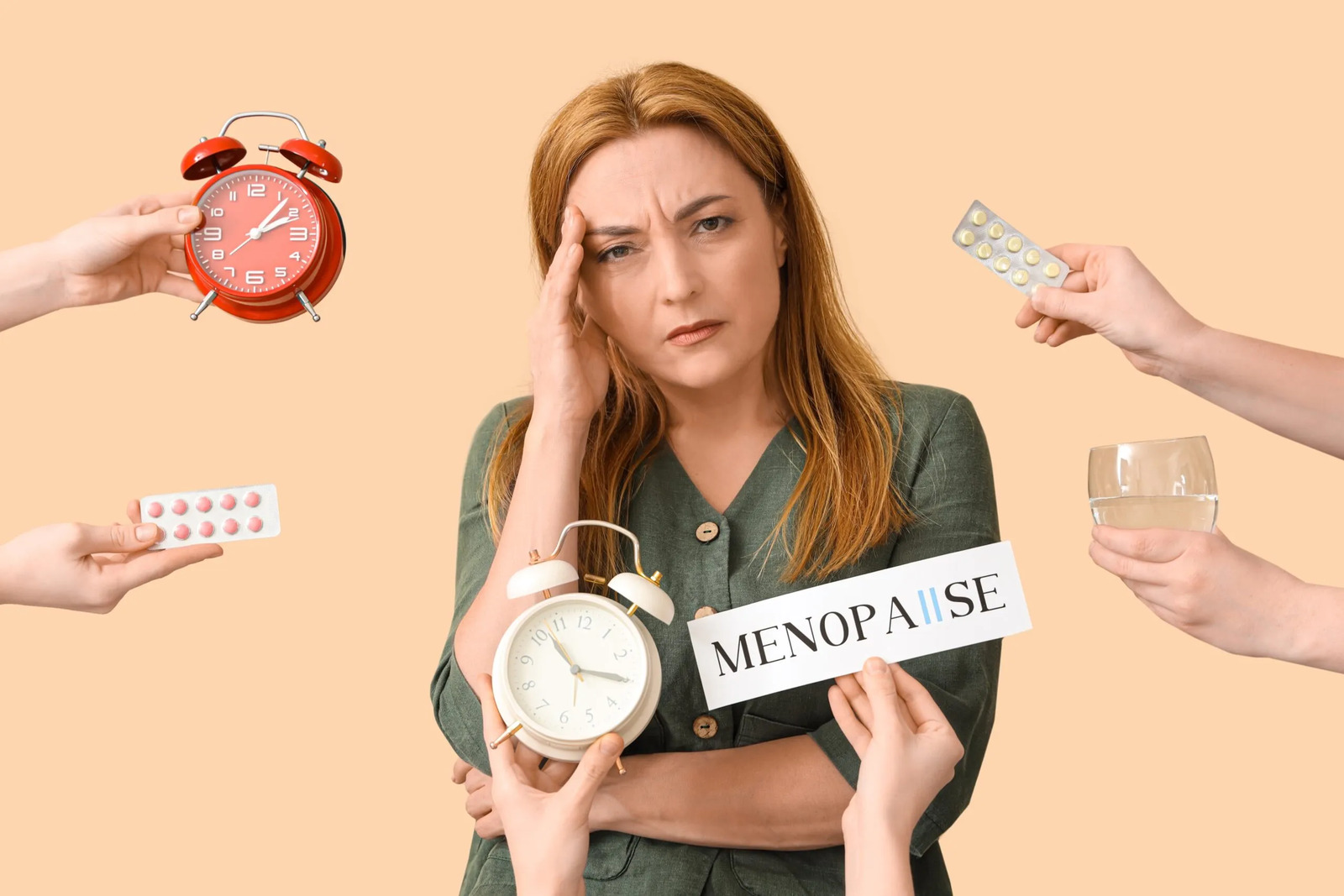Understanding the Hormonal Shifts and Practical Steps for Maintaining Pelvic and Overall Wellness
Understanding the Hormonal Shifts and Practical Steps for Maintaining Pelvic and Overall Wellness

Menopause marks a significant life transition for women, typically occurring in the late 40s to early 50s when the ovaries stop producing eggs, and levels of estrogen and progesterone decrease. This hormonal shift brings a wide range of physical, emotional, and psychological changes, with notable effects on pelvic health. However, menopause's impact is not confined to the pelvic region alone—general bodily changes caused by hormonal fluctuations are also important to understand for maintaining overall health during this phase.
In this post, we will explore how hormonal changes during menopause affect the pelvic floor and body as a whole, offering insight into the complex relationship between hormonal shifts and pelvic health. We will also provide actionable steps to support your pelvic health and general well-being during this stage of life.
Understanding the Hormonal Changes of Menopause
Menopause is driven primarily by the decline in estrogen and progesterone levels, hormones that play vital roles in reproductive health and numerous other bodily functions. The transition to menopause occurs gradually, starting with perimenopause, which may begin several years before the final menstrual period.
Estrogen and Progesterone Decline
Estrogen: Estrogen is responsible for regulating the menstrual cycle, maintaining vaginal and pelvic floor health, protecting bones, and influencing mood. As estrogen production declines during menopause, several key physiological changes occur:
- Vaginal tissues lose elasticity, leading to vaginal dryness and reduced lubrication.
- Pelvic floor muscles may weaken, increasing the risk of urinary incontinence and pelvic organ prolapse.
- Bone density can decrease, increasing the risk of osteoporosis and fractures.
- Skin may lose its firmness and elasticity, leading to wrinkles and sagging.
- Mood fluctuations such as anxiety, irritability, and depression may increase due to changes in neurotransmitter function influenced by estrogen.
Progesterone: This hormone helps regulate the menstrual cycle and supports pregnancy. As progesterone levels decrease during menopause, some women experience:
- Sleep disturbances, including insomnia or poor-quality sleep, as progesterone plays a role in promoting restful sleep.
- Increased anxiety or mood swings, as progesterone has a calming effect on the brain.
In addition to estrogen and progesterone, there are other hormones that fluctuate during menopause, including testosterone (which plays a role in libido) and follicle-stimulating hormone (FSH), which increases as the body tries to stimulate the ovaries to produce more estrogen.
Impact of Hormonal Changes on the Pelvic Floor
The pelvic floor is made up of muscles, ligaments, and tissues that support the pelvic organs, including the bladder, uterus, and rectum. The pelvic floor muscles are especially sensitive to the hormonal changes that occur during menopause.
Pelvic Floor Muscle Weakness
As estrogen levels drop, the elasticity and strength of the pelvic tissues decrease. This can lead to the following pelvic health issues:
- Urinary Incontinence: Reduced estrogen levels can weaken the pelvic floor muscles, making it more difficult to control the bladder, particularly when engaging in physical activities that increase intra-abdominal pressure (such as coughing, sneezing, or lifting). This may result in stress urinary incontinence (SUI).
- Pelvic Organ Prolapse: The weakening of pelvic floor muscles and the loss of vaginal tissue integrity can lead to pelvic organ prolapse (POP). In this condition, the bladder, uterus, or rectum may descend into or protrude from the vaginal canal due to insufficient support from the pelvic muscles.
- Vaginal Atrophy: Estrogen helps maintain the integrity of vaginal tissues. As estrogen declines, vaginal tissues may become thinner, drier, and less lubricated, which can cause discomfort, pain during sex, and an increased risk of urinary tract infections (UTIs).
Changes in Pelvic Health-Related to Estrogen
- Vaginal Dryness: Low estrogen levels during menopause lead to reduced vaginal lubrication and thinning of vaginal tissues, resulting in dryness and discomfort during intercourse. This condition is known as vaginal atrophy.
- Sexual Health: In addition to vaginal dryness, menopause can also lead to a decreased libido due to a reduction in testosterone, which is partly responsible for sexual desire. Some women also report pain during intercourse due to changes in vaginal tissue elasticity, leading to dyspareunia (painful sex).
General Bodily Changes Beyond the Pelvic Floor
While the pelvic floor is particularly affected by hormonal changes during menopause, the entire body experiences the impact of estrogen decline, leading to several physical and emotional changes that can indirectly affect pelvic health.
Bone Health
- Osteoporosis: As estrogen levels decline, women experience a loss of bone density, which can increase the risk of fractures and osteoporosis. The pelvic bones and spine can be affected, and women may be more susceptible to fractures from falls or other accidents.
Cardiovascular Health
- Increased Risk of Heart Disease: Estrogen is protective of the cardiovascular system, and its decline during menopause can increase the risk of heart disease, including high blood pressure, cholesterol imbalance, and arterial plaque formation.
- Weight Gain: Changes in metabolism and hormonal shifts often lead to weight gain, particularly around the abdomen. This increase in intra-abdominal pressure can impact pelvic floor function and exacerbate issues like incontinence or prolapse.
Cognitive and Mood Changes
- Brain Fog: Many women experience difficulties with memory, focus, and concentration during menopause. This phenomenon, sometimes referred to as "brain fog," is associated with the reduction in estrogen and its effects on brain chemistry.
- Mood Swings and Anxiety: The hormonal fluctuations during menopause can cause emotional instability, including mood swings, anxiety, irritability, and depression. The decrease in progesterone, in particular, can contribute to these changes, which can affect overall well-being.
What You Can Do to Support Your Pelvic Health During Menopause
Although hormonal changes during menopause are inevitable, there are many proactive steps you can take to protect and strengthen your pelvic floor and overall health:
1. Pelvic Floor Exercises
Strengthening the pelvic floor muscles through Kegel exercises is one of the most effective ways to counteract muscle weakness caused by estrogen decline. This can help prevent or manage urinary incontinence and reduce the risk of pelvic organ prolapse. You can also consider working with a pelvic health physiotherapist to guide you in creating a tailored exercise plan.
2. Vaginal Moisturizers and Lubricants
To address vaginal dryness, use vaginal moisturizers regularly and water-based lubricants during sexual activity. For more persistent dryness, speak to your doctor about possible treatments like topical estrogen creams or vaginal estrogen rings.
3. Bladder Training
If you experience bladder urgency or incontinence, consider bladder training. This method involves gradually increasing the intervals between urination to retrain the bladder to hold urine for longer periods. It can help reduce the frequency and urgency of bathroom trips.
4. Maintaining a Healthy Diet and Regular Exercise
Eating a nutrient-rich diet full of fiber, vitamin D, and calcium can support bone health, digestion, and overall pelvic health. Regular exercise, including strength training and aerobic activity, can improve pelvic floor strength, maintain cardiovascular health, and manage weight.
5. Stress Management
Incorporating relaxation techniques such as yoga, mindfulness, or deep breathing exercises can help manage menopause-related stress and anxiety. Reducing stress can also alleviate the tension in the pelvic floor muscles that can contribute to incontinence or pelvic pain.
6. Consult with a Healthcare Provider
If you’re experiencing severe symptoms related to menopause or pelvic health, such as incontinence, prolapse, or pain during intercourse, consult with a healthcare provider. Hormone Replacement Therapy (HRT) may be an option to manage some of the symptoms, though it may not be suitable for everyone.
Conclusion
Menopause brings profound hormonal changes that impact both the pelvic floor and the body as a whole. Understanding the relationship between estrogen, progesterone, and overall health during this transition can empower women to take charge of their well-being.
By incorporating pelvic floor exercises, maintaining a healthy lifestyle, managing stress, and seeking professional support, women can navigate menopause with greater ease and preserve their pelvic health. Don’t hesitate to reach out to healthcare providers who specialize in menopause and pelvic health for personalized guidance.


